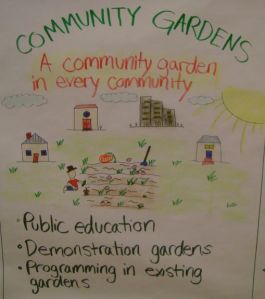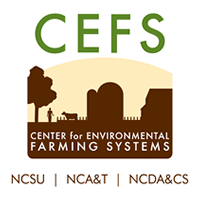To have your name added, contact Amber Polk at amber_polk@ncsu.edu.
Notes from the SUMMIT breakout sessions can now be found on the WIT pages linked below.
- F2F Core Team
- Game Plan
- Advisory Committee
- NC Food NETwork: a North Carolina Food System directory
- SUMMIT
- Working Issues
- Communications
- Community Gardens
- Direct Marketing
- Farm to School
- Local Government & Land Use
- New and Transitioning Farmer Support
- Processing & Food Systems Infrastructure
- Public Health & Food Access Disparities
- Retail & Institutional Markets
- Youth and Social Networking
- Formalizing the Initiative: Foundations & Baselines
- Regional Meetings
- How are we defining LOCAL?
- Regional Meetings Overview & Summary
- Triangle Region SUMMIT breakout session notes
- Mountain Region SUMMIT breakout session
- NorthEast Region SUMMIT breakout session notes
- Southeastern Region SUMMIT breakout session notes
- Triad Region SUMMIT breakout session notes
- Raleigh meeting
- Burgaw meeting
- Asheville
- Charlotte/Concord
- Winston-Salem
- Greenville
Golden Leaf Foundation
Z. Smith Reynolds
Ag Advancement Consortium
W.K. Kellogg Foundation
- CEFS
- Contact Information Form
- NC Choices
- NC Food Network
- Wayne Food Initiative
Community Gardens

Highlights from Day 1, SUMMIT, May 11th:
Community Gardens F2F SUMMIT ppt
• Education – participants are really excited about how we teach people to garden and, beyond that, how to manage a garden, how to sustain a garden group’s commitment, how to cook with the produce that comes out of the garden, how to prepare it for sale, how to preserve it . . .
Want a centralized tool kit that can be used by anyone anywhere to teach the “how to’s.” Such a toolkit would include information pertaining to:
- Access funds
- Work with policy makers to acquire land
- Develop private/public partnerships
• Continue to see huge value in mapping and networking existing gardens
• A lot of positive energy around creating “educational hubs” – really do a good assessment of where we have models now that we can learn from and which areas need the development of an educational demo/hub garden.
• Issue of certification was discussed unfavorably—but many intrigued by the idea of branding a community as “local-food friendly” and integrate community gardens into the criteria for this type of branding/certification.
Original WIT meeting leader: Lucy Bradley, Urban Horticulutre Specialist, NCSU Cooperative Extension; 919-513-2001, Lucy_Bradly@ncsu.com
Staff: Tes Thraves
Background
Community gardening facilitates growing healthy food, plants, people and communities in a culturally diverse, collaborative, and physically active environment, while building soil, conserving resources, and protecting public green space. In his dedication of community garden at the USDA in DC, Ag Secretary Vilsack said,
It is essential for the federal government to lead the way in enhancing and conserving our land and water resources,” said Vilsack. “President Obama has expressed his commitment to responsible stewardship of our land, water and other natural resources, and one way of restoring the land to its natural condition is what we are doing here today – “breaking pavement” for The People’s Garden. Community gardens—understood to include gardens in neighborhoods, housing facilities, faith communities, schools, business and other, and as having strong ties to in-town farms—offer a well-developed and well-researched option for “shovel ready” direct action, with a track record going back to the Victory Gardens of the 1940s and earlier. They are cost-effective, and offer countless opportunities for grassroots, “sweat equity” democratic participation in their creation and management. Incorporation of gardens into school areas provides for hands-on, outdoor education about sustainability, stewardship, and food production, as well as providing exposure to foods and cooking that can establish positive life-long health habits.
North Carolina Perspective
Within North Carolina, the Community Garden Partners Initiative established through the NC Division of Public Health, NC Agricultural Extension, and others has held a number of steering committee meetings, has considerable statewide strategic planning underway, and is developing a “how to” guide which will be web-available. Networking initiatives include the Piedmont Interfaith Network of Gardens (PING) and the Rural Advancement Foundation International (RAFI) Come to the Table effort, which has coordinated faith-based community gardens in regions across NC and facilitated a series of training workshops in each locale. Mecklenburg County has one of the largest “open” garden networks in the Southeast. In Asheville, Bountiful Gardens hosts and partners multiple gardens and manages a demonstration garden; Anathoth Community Garden holds regular workshops in the rural piedmont; SEEDs (South Eastern Efforts Developing Sustainable Spaces) in Durham assists in the development of new urban community gardens and employs youth to manage a garden from seed to sale; and CASTLES in Goldsboro has a school farm and cross-curriculum seed to sales program for K-4 grade school children.
Issues Under Discussion
For community gardens to reach full potential in North Carolina there needs to be active support and funding from local and state agencies and other organizations to create and manage community gardens. Identifying existing gardens as well as supporting and networking these efforts is a needed first step. In addition, there is a need for government policies and planning guidelines that support and advocate sustainable community gardens on public land and other suitable sites.Game Changer
Community Gardens Initiative: a community garden in every community – an active effort networking partners to develop new educational/demo Community Gardens across the state, particularly in regions where such hubs do not exist. The development of these demo gardens plus programming held at these and existing gardens will facilitate and support the development of many more active and sustainable Community Gardens.
Other Statewide Action Plan Ideas
• Branding/certification system of Bountiful Cities – in cooperation with transition cities/sustainability and green campaigns, foregrounding Community Gardens as a component of sustainable practices
• CG Job Stimulus initiative – adult and youth business plan model implemented statewide
• Heritage Garden Campaign – program linking with slow foods, but addressing cultural component of growing and preserving and eating food as community builder—in all communities
Local Action Ideas
• Map of locations and models of NC Community Gardens: documentation of various designs from across the state (and otherwise) to inspire and guide new efforts in multiple settings and organizations (rural, urban, neighborhood, faith community, schools, businesses, extension offices, etc)
• Adaptable Power Point template for “selling” worth of community gardens
• Housing Authority and Local Policy resource package (how to language and policies for governmental support of community gardens and urban agriculture)
• Business Plan models for creating entrepreneurial opportunities through Community Gardens and for making Community Gardens self-sustaining
• How to Kit – including such tools as how to organize from within a community group, acquire land, recruit youth, manage a garden, sustain an organizational structure, grow plants and food using sustainable methods, acquire funding and create self-funded projects, promote the value of community gardening, and outreach to new populations.
.
Notes from CG WIT SUMMIT BREAKOUT session:
Game Changer Idea: Community Gardens Campaign: a community garden in every community (growing the number of active CGs and increasing the number of educational hub/model CGs across the state)
Note:
- existing efforts!!
- NC CG Task Force working on survey, maps, and has listserv
- Come to the Table
- Seeds
- Bountiful Cities
- sustainability hard—starting new gardens easy
- need to define role of CG in the local food movement (and how backyard gardens fit into CG model)
- note the continual overlap between local ideas and statewide—mostly statewide ideas is application on broad scale of local ideas
Overall Comments
- how to kit
- specifics for different sites (churches, working with teachers . . .)
- lending libraries of tools
- grants and funding opportunities
- www.eenorthcarolina.org for posting events and resources
- profile ‘hub’ successful gardens
- need to define the breadth of “community” CGs
- include neighborhoods
- businesses
- church
- schools\urban and rural
- CG Tour (ala farm tour)
- partner with bike enthusiasts for bike tour
- CG training available statewide—disseminated at hubs through Ag extension
- state sponsored
- scaling up potential
- at ALL schools
- canning back in schools, cooking
- change school regs so food grown on site can be consumed on site
- schools as community centers
- composting education
- Health campaign
- include department of AG with healthy environments collaborative
- partner with community kitchens for value added processing
- linking state and regional farmers markets with community gardens
- utilize existing structure
- neighborhood associations
- extension, master gardeners (“Winston grows” ag extension grants, Ed O’Conner
- universities-service learning programs
- European model of allotment gardens
- parks and rec
StateAction Ideas
- certification idea is not appealing without clarification
- soil certification
- about the particular community
- job stimulus idea
- who is working on this?
- job career paths? for youth
- paid positions for youth
- heritage garden campaign
- modeling/partnering with seed saving of native, heritage, heirloom plants and traditions
- identify ethic groups and cultures of places
Other statewide Ideas
- CG trust
- state-owned land
- state policies for land-use
- tool kit for local gov needs—how to for gov and how to for those working with gov, zoning info
- chickens in cities
- food/ag in public planning
- parks/libraries, etc, public gardens in public spaces
- tax incentives
- Development partnerships
- farms not golf courses
- Maintaining/Sustaining
- lending network for restoring failed gardens
- sustainability plans for garden continuance
- corporate sponsorship (lowes is NC company)
- get away from bog box stores—use local businessses
- Eating Education/preservation/city foraging
- Public Television GIG (get involved with gardening)
- 30 minute programming, Johnny Gregory’s idea 336-275-6009
LOCAL ACTION Ideas
Map of Locations and models
Adaptable Power Points for selling worth
- local business sponsorships
- restaurant alliances and buying power
Local Policy resource package
- media resource package
Business Plan models for creating entrepreneurial opportunities
NEW LOCAL ACTION ideas:
- Holiday food celebrations at community gardens
- education sited at community gardens (cooking and prepping)
- CG in communities of need
- digital Divide access—site at libraries
- landowner network for gifting
- community service in community gardens
- local awards and recognition for leaders
- create a CFSA for Community Gardens – Carolina Community Gardening Stewardship Association
- expanding community gardens rather than creating more
- teach the teachers
